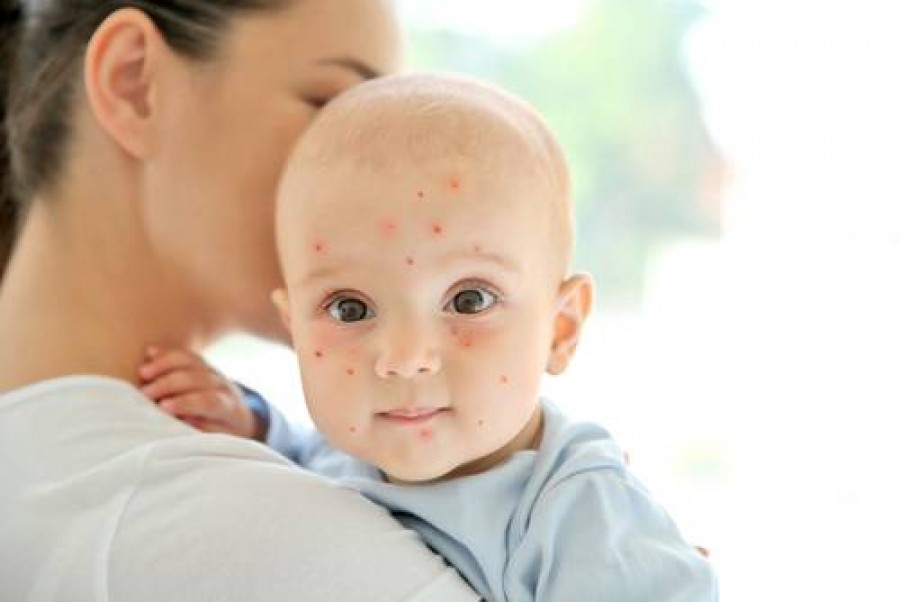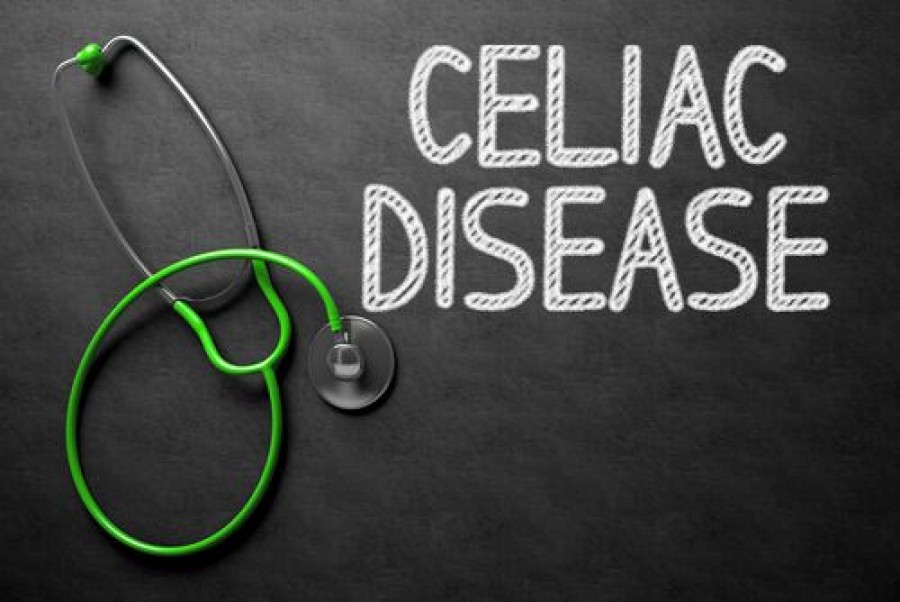Chickenpox in Babies: Definition, Symptoms and Care

Can my baby be affected by chickenpox? How do I prevent my baby from getting chickenpox? What is the treatment for chickenpox in babies? Such questions come naturally to parents’ minds that have a little one to take care of.
With modern pregnancy and newborn medical care, most babies are vaccinated for chickenpox soon after birth. If your baby has been vaccinated for chickenpox on time, it is less likely that your baby gets infected. However, getting vaccinated does not guarantee that your baby will not get chickenpox at all. There are still chances that you baby gets affected by it.
What is chickenpox?
Chickenpox (Varicella) is a highly contagious viral infection that causes blisters like rash on the skin and is preventable only if a person has been vaccinated. Chickenpox is a periodic disease and most people get affected by chickenpox only once in their lifetime. Only in rare cases are people observed to have chickenpox more than once in their lifetime.
Although the chances of your baby being infected by chickenpox during the first year of birth are really low, the affects of the disease on a baby are more severe when compared to an adolescent or an adult.
Symptoms of Chickenpox in Babies
The following are common symptoms and may indicate that your baby has chickenpox:
High temperature
Fever is one of the most common symptoms of chickenpox in babies. Babies, as well as adults, infected with chickenpox usually have a fever before rashes start to appear on their skin. However, a fever in babies may not always be an indicative of the baby being infected by chicken pox. High body temperature is commonly observed before chickenpox rashes appear on a baby’s body and therefore, regular monitoring of your baby for bodily temperatures is advised.
Sore throat
A sore throat is also a common symptom of chickenpox in babies. When dealing with chickenpox, babies require serious attention as they are in their primary growing age. Sore throat, if not taken care of, leads to fever in babies in most cases.
Headaches
Your baby infected by chickenpox might also encounter headaches, but unlike adults, headaches in babies are a lot harder to notice. Baby headaches may cause nausea, vomiting etc. in babies. Most of all, parents should check for a pressing tightness in the muscles of the head or neck of the baby.
Intense rashes and blisters
Major contributions to the nuisance of chickenpox, especially in babies, are the rashes and blisters that appear on the surface of the skin. These blisters start off as small red bumps that can spread as far as the baby’s tongue which can give your baby serious discomfort.
Loss of appetite
A combination of sore throat, fever and rashes/blisters spread to the baby’s mouth, can cause your baby discomfort while having food. Therefore, it is commonly observed, that babies tend to not eat as much when infected by chickenpox.
How can your baby get infected by chickenpox?
Chickenpox is a viral infection and can be easily spread from person to person through coughing, sneezing, physical contact, etc.
Blisters on your baby’s skin may start appearing anywhere from day 10 to 20 after making contact with an infected person or child. It is highly recommended that you keep your baby from making any contact with infected individuals whether or not your baby has received the necessary vaccinations.
People who are infected with shingles may also spread chickenpox in babies who have not taken their routine immunization yet. Incase your baby has already been infected with chickenpox, it is suggested that you keep him or her indoors and away from other newborn babies, especially from the ones that have not received their chickenpox vaccinations.
Curing chickenpox in babies
Unless a baby has been vaccinated beforehand and has not been infected, no medication in particular can help you treat the viral infection. This is because the infection cannot cause any serious threat to your baby’s health, you should let the disease take its course and your baby should recover in due time.
The only course of action you can take, as a parent while your baby is infected, is to give supportive care measures. Proper steps to ease your baby’s pain, fever, sore throat etc. is the most one can do for children under the age of 12 years infected by chickenpox. Such supportive care may not fight the viral causing chickenpox however it will help your baby recover faster.
The following are a few methods parents can accomplish this goal:
Anti-viral therapy
Anti viral therapy usually depends upon the age of the patient. Most pediatricians do not prescribe any antibiotics for babies less than 2 years of age but depending upon the situation and the baby’s condition, as incase of a very high fever, your doctor may prescribe antibiotics (anti-viral therapy) to reduce the baby’s fever.
Prevent scratching
Blisters on the skin during chickenpox can be discomforting to the baby. Babies tend to scratch the blisters on their skin during chickenpox. Keeping your baby from scratching their blisters is an essential part of the healing process. If chickenpox blisters are scratched it might cause pain, permanent scars and may also cause further spreading of chickenpox rashes and blisters on the baby’s body.
Non-prescription medicines
In case of severe discomfort, it may be a good idea to ask your baby’s pediatrician if they can allow some over-the-counter antihistamine medicine to relieve itching. You may also try applying anti-itching ointments on the rashes and painful blisters on the skin.
Keeping hydrated
Make sure you keep your baby hydrated during chickenpox. Give your baby lots of liquids to prevent them from dehydration that can help prevent further inflammation of the skin. If your baby is reluctant from ingesting any food or drink due to pain and discomfort, you can try feeding your baby using a syringe.
Preventing fever
One of the fast and easy methods to relieve fever in babies it to give your baby a bath. Giving your baby frequent baths or putting wet strips of cloth over the baby’s forehead helps bring down their bodily temperature. However, make sure the water is mild in temperature i.e. it is neither too hot nor too cold.
Since high fever in babies can be dangerous in many cases, it is always best to visit your baby’s pediatrician as a precaution just in case your baby’s temperature does not subside within 1 to 2 days.
Provide relaxation
Good sleep and relaxation is essential in the swift recovery of your baby from chickenpox. Make sure your baby rests as much as possible to gain back its lost energy from crying, screaming and restlessness etc.
Sanitization
Keeping your baby’s surroundings clean is also essential when your baby is sick, especially when your baby is infected with chickenpox. The effects of chickenpox in babies can last longer if the blisters are provided with a dirty environment to thrive in.
Preventative care
Since chickenpox is a viral infection, the only preventive measure one can take is to get vaccinated for chickenpox. If your child is 18 months of age or older, they are eligible for chickenpox immunization. The immunization then protects your baby from chickenpox. It is a good idea to get your baby immunized after consulting with your baby’s health practitioner.
When should you take your baby to the doctor?
If your baby is infected by chickenpox, it is highly advisable to visit your baby’s doctor straight away for proper medical advice. However, it is absolutely necessary to seek medical help for your baby if your baby seems sicker and weaker than normal sickness days or has high fever or has difficulty while breathing etc.
Also, if your baby is unable to swallow, isn’t getting much sleep, has blisters on the eyes, or has skin swollen around their blisters, it is a definite red flag and immediate medical help for the baby is required.
Helpful Tip(s)
- Keep monitoring your baby’s body temperature as it may lead to life threatening health conditions.
- Do not give any hard food to your baby, as it will be very painful for the baby to ingest any solid food. Try giving them very soft textured food such as meshed rice, or softened cereal.
- Keep your baby lightly clothed to help reduce the fever.



